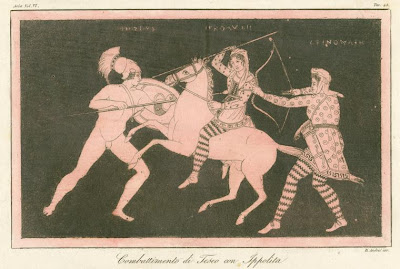But I Will Wed Thee in Another Key

THESEUS AND HIPPOLYTA
Theseus is one of the founding kings of Athens. His mother was Aethra, the princess of Troezen, and his father was Aegeus, the Athenian king -- and also Poseidon, god of the sea. In a story similar to that of England’s Arthur and the Sword in the Stone, when Theseus came of age, he claimed Aegeus’s sword and sandals, which had been hidden under a rock. Attempting to prove his worthiness to be Aegeus’s heir, Theseus volunteered to be sent to Crete, hoping to end the series of Athenian sacrifices to the Minotaur. He was able to make his way into and out of King Minos’s labyrinth and kill the Minotaur with the help of Minos’s daughter Ariadne. After making their escape from Crete, Theseus abandoned Ariadne on the island of Naxos. Before leaving on his quest, Theseus had agreed to change the sails of his ship from black to white if he succeeded. He neglected to change the sails; Aegeus saw the black sails, believed his son was dead, and threw himself into the sea (now called the Aegean) in despair.
Rejected by the nobles of Athens, Theseus went into voluntary exile. During this time, he waged war against the Amazons, capturing their queen, Hippolyta. Soon after, in some versions of the myth, the Amazons attacked Athens, and Theseus led the successful defense. With their insistence on women’s rule and military prowess – and with their reliance on men only for the purposes of procreation – the Amazons presented a challenge to Greek male ideas about civilization and natural order. Theseus, the archetypal Athenian hero, was compelled to set things right, at least from the perspective of such ideas.
Some versions of the myth report that Theseus had earlier married Phaedra, a princess from his mother’s country. After Theseus went back to her, Hippolyta returned to the Amazon lands, leaving their son Hippolytus with Theseus. Other versions say that Hippolyta defiantly appeared at the subsequent wedding of Theseus and Phaedra, along with Hippolytus, and demanded that Theseus remain faithful to her; in response, the wedding guests killed her. In all versions, the eventual fates of Hippolytus and his stepmother Phaedra are also the stuff of tragedy.
This classical lore is complicated in Shakespeare’s retelling by another source, The Canterbury Tales. Here’s the beginning of “The Knight’s Tale,” the first in Geoffrey Chaucer’s collection of stories. The narrative eventually features two gentlemen fighting over one lady (sound familiar?), with one of the gentlemen disguising himself as an attendant named Philostrate (that is, “the man brought down by love”). But it opens with Theseus and Hippolyta –
Whilom, as olde stories tellen us,
Once upon a time, as old stories say,
Ther was a duc that highte Theseus;
There was a duke named Theseus:
Of Atthenes he was lord and governour,
Of Athens he was lord and governor,
And in his tyme swich a conquerour,
And in his time was such a conqueror
That gretter was ther noon under the sonne.
That none was greater under the sun.
Ful many a riche contree hadde he wonne,
Full many a rich country had he subdued
What with his wysdom and his chivalrie;
With his wisdom and his military might:
He conquered al the regne of Femenye,
He conquered all the realm of Womankind,
That whilom was ycleped Scithia,
That once was called Scythia,
And weddede the queene Ypolita,
And wedded the queen Hippolyta,
And broghte hir hoom with hym in his contree,
Bringing her home with him to his country
With muchel glorie and greet solempnytee,
With much glory and great solemnity,
And eek hir yonge suster Emelye.
And also her young sister Emily.
And thus with victorie and with melodye
And thus with triumph and with song
Lete I this noble duc to Atthenes ryde,
I let this noble duke ride to Athens
And al his hoost, in armes hym bisyde.
Along with all his armed host beside him.
And certes, if it nere to long to heere,
And truly, were it not too long to hear,
I wolde have toold yow fully the manere
I would have told you fully the manner
How wonnen was the regne of Femenye
How the realm of Womankind was won
By Theseus, and by his chivalrye,
By Theseus and by his knights
And of the grete bataille for the nones
And of the great battle at that time
Bitwixen Atthenes and Amazones,
Between Athens and the Amazon lands,
And how asseged was Ypolita
And how besieged was Hippolyta
The faire hardy queene of Scithia,
The fair and hardy queen of Scythia,
And of the feste that was at hir weddynge,
And of the festival at their wedding,
And of the tempest at hir hoom-comynge;
And of the tempest at their homecoming;
But al the thyng I moot as now forbere . . .
But all of that I must, just now, forbear . . .
But much of what Chaucer’s Knight skips over, William Shakespeare explores in detail in A Midsummer Night's Dream.
The Flatwater Shakespeare Company presents
A Midsummer Night’s Dream
directed by Bob Hall
Dates: June 15-19, 22-26
Time: 7:30 p.m.
Place: Lincoln Community Foundation Gardens
"N" Street, Between 14th and Centennial Mall, Lincoln
Information: 402-473-2897
$10 Suggested Donation
(Illustration from a Greek vase showing Theseus attacking Hippolyta, who is defended by Deinomache.)


